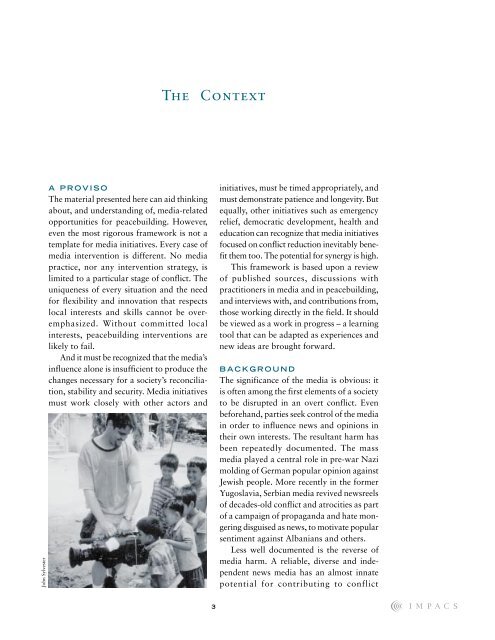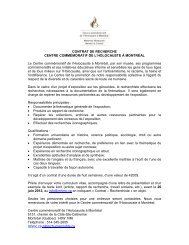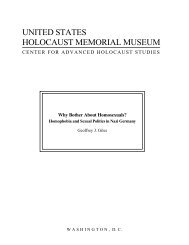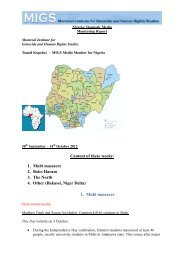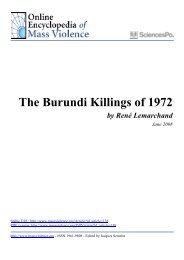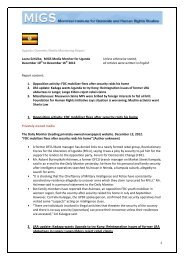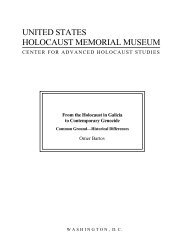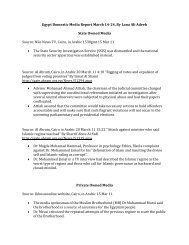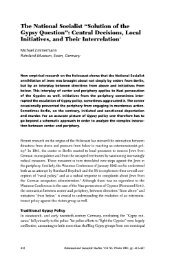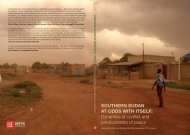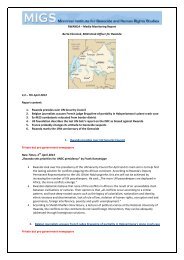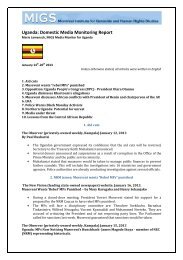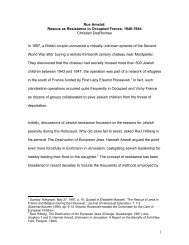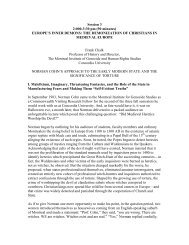The ContextJohn SylvesterA PROVISOThe material presented here can aid thinkingabout, <strong>and</strong> underst<strong>and</strong>ing of, media-relatedopportunities <strong>for</strong> peacebuilding. However,even the most rigorous framework is not atemplate <strong>for</strong> media initiatives. Every case ofmedia intervention is different. No mediapractice, nor any intervention strategy, islimited to a particular stage of conflict. Theuniqueness of every situation <strong>and</strong> the need<strong>for</strong> flexibility <strong>and</strong> innovation that respectslocal interests <strong>and</strong> skills cannot be overemphasized.Without committed localinterests, peacebuilding interventions arelikely to fail.<strong>An</strong>d it must be recognized that the media’sinfluence alone is insufficient to produce thechanges necessary <strong>for</strong> a society’s reconciliation,stability <strong>and</strong> security. <strong>Media</strong> initiativesmust work closely with other actors <strong>and</strong>initiatives, must be timed appropriately, <strong>and</strong>must demonstrate patience <strong>and</strong> longevity. Butequally, other initiatives such as emergencyrelief, democratic development, health <strong>and</strong>education can recognize that media initiativesfocused on conflict reduction inevitably benefitthem too. The potential <strong>for</strong> synergy is high.This framework is based upon a reviewof published sources, discussions withpractitioners in media <strong>and</strong> in peacebuilding,<strong>and</strong> interviews with, <strong>and</strong> contributions from,those working directly in the field. It shouldbe viewed as a work in progress – a learningtool that can be adapted as experiences <strong>and</strong>new ideas are brought <strong>for</strong>ward.BACKGROUNDThe significance of the media is obvious: itis often among the first elements of a societyto be disrupted in an overt conflict. Evenbe<strong>for</strong>eh<strong>and</strong>, parties seek control of the mediain order to influence news <strong>and</strong> opinions intheir own interests. The resultant harm hasbeen repeatedly documented. The massmedia played a central role in pre-war Nazimolding of German popular opinion againstJewish people. More recently in the <strong>for</strong>merYugoslavia, Serbian media revived newsreelsof decades-old conflict <strong>and</strong> atrocities as partof a campaign of propag<strong>and</strong>a <strong>and</strong> hate mongeringdisguised as news, to motivate popularsentiment against Albanians <strong>and</strong> others.Less well documented is the reverse ofmedia harm. A reliable, diverse <strong>and</strong> independentnews media has an almost innatepotential <strong>for</strong> contributing to conflict3
4 • AN OPERATIONAL FRAMEWORK FOR MEDIA AND PEACEBUILDINGresolution. It functions as a channel ofcommunication that counteracts misperceptions.It frames <strong>and</strong> analyzes the conflict,identifies the interests, defuses mistrust,provides safe emotional outlets, <strong>and</strong> more.As Robert Karl Manoff of New YorkUniversity’s Center <strong>for</strong> War, Peace <strong>and</strong> theNews <strong>Media</strong> points out, these are preciselysome of the elements that are involved in aconflict-resolution process.Some agencies <strong>and</strong> nongovernmentalorganizations interested in peacebuildinghave devoted ef<strong>for</strong>ts to encouraging areliable, diverse <strong>and</strong> free news media wherepossible in conflict-stressed environments.The most prevalent interventions havefocused on basic training <strong>for</strong> journalists, theprovision of technology <strong>and</strong> establishingbasic legal protections <strong>for</strong> journalists.Recently, new initiatives have focused onthe media as a means to communicatein<strong>for</strong>mation specifically intended to fosterpublic sentiment favouring peaceful resolutionof conflict. The focus is on the effect of themedia in its widest possibilities rather thanthe mere presence of professional news mediaoutlets. The media thus becomes a facilitatorof positive social change rather than aprofessional, disinterested observer/reporter.Under no circumstances, however, is thepromotion of biased in<strong>for</strong>mation or viewpointsmasquerading as journalism a validapproach.The examples of media <strong>and</strong> peacebuildingare growing but there is little documentation<strong>and</strong> analysis. <strong>An</strong>d the field is highly dynamic.The potential <strong>for</strong> synergy between thecommunication skills of journalism <strong>and</strong> theproactive people-centred approach of conflictresolution is particularly exciting. The finaldimensions of media <strong>and</strong> peacebuilding willnot be mapped soon. This framework aimsto strengthen peacebuilders’ capacity to morequickly grasp the existing possibilities, <strong>and</strong> toencourage exploration of entirely new ones.WHAT IS THE MEDIA?<strong>Media</strong> here refers to the several mediums orchannels used in an organized fashion tocommunicate to groups of people.Newspapers, radio <strong>and</strong> television are wellknownexamples. The Internet <strong>and</strong> WorldWide Web are more recent additions.However, <strong>for</strong> the purposes of peacebuilding,media encompasses more than just the news<strong>and</strong> in<strong>for</strong>mation business so typical of thosechannels. Entertainment programs frommusic to soap operas are part of the media.So are other channels including street theatre,posters, traditional story-telling, <strong>and</strong> evencomic books, to name only some.The news media, or journalism, remainsin the <strong>for</strong>efront of peacebuilding initiativesbecause at its best, it is the safeguard ofdemocratic governance. At its best meansaccurate <strong>and</strong> balanced reporting which fairlyrepresents a diversity of views sufficient <strong>for</strong>the public to make well-in<strong>for</strong>med choices. Areliable <strong>and</strong> diverse media that can expressitself freely provides early warning ofpotential outbreaks of conflict. It serves as awatchdog over leaders <strong>and</strong> officials <strong>and</strong> holdsthem accountable. It monitors human rights.Its presence is essential to the functioning ofother civil society actors. In less optimalenvironments, the media can still fosterstability by providing essential in<strong>for</strong>mationabout humanitarian initiatives.This framework explores in detail manyof the specific indicators by which mediafreedom, diversity <strong>and</strong> reliability can bemeasured, <strong>and</strong> offers strategies <strong>for</strong>responding. However, the key conditionsessential <strong>for</strong> a functioning free media can beboiled down to these: a state’s commitmentto Article 19 (the right to freedom ofexpression) of the Universal Declaration ofHuman Rights; a constitutional <strong>and</strong> legalinfrastructure to protect free expression <strong>and</strong>privacy rights; <strong>and</strong>, independent regulatorsof media rights <strong>and</strong> public responsibilities.


